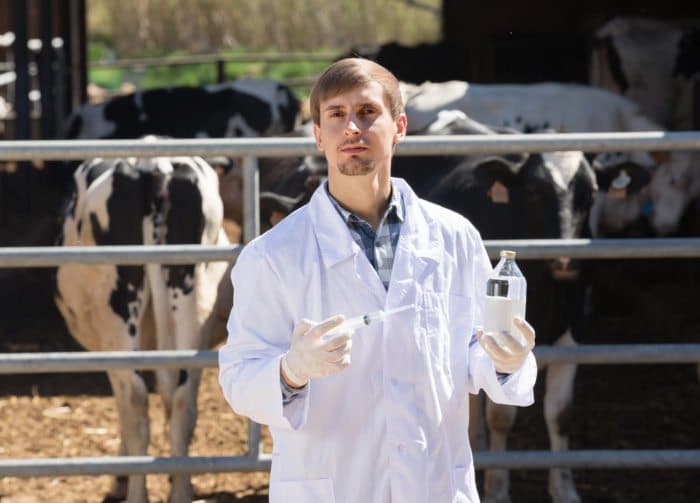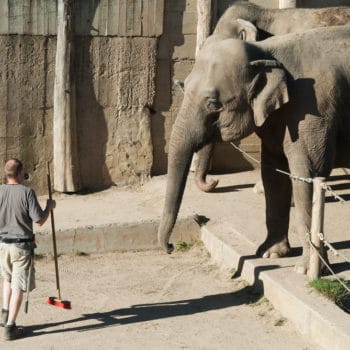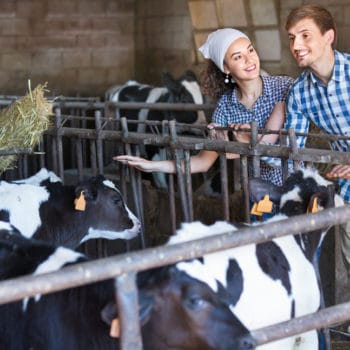Why We Love It
-
$71,830Potential Avg. Salary
-
10.3%Job Growth Rate
-
Growing DemandJob Outlook
-
Good Entry Level SalaryCareer Attribute
Animal nutritionists ensure all types of animals—domestic, farm, and zoo animals—are fed a nutritious diet. They may work for formulate recipes for animal food that are tasty, healthy, and cost-friendly, or they may conduct testing of animal food to determine if the food provides the necessary nutrition.
Recommended Schools
What is an Animal Nutritionist?
The following job responsibilities are common for individuals in animal nutritionist roles:
- Conduct tests to evaluate the nutritional value of foods being fed to domestic, farm, and zoo animals
- Create recipes for and formulate proportions of foods that provide meet animal nutritional needs
- Formulate recipes that animals find tasty, that meet nutritional needs, and that are cost-friendly for animal caretakers
A Day in the Life
Animal nutritionists are concerned with the diets of all types of animals, including domestic, farm, and zoo animals. They may work for pet food manufacturing companies and help develop pet food recipes that provide adequate nutrition, are appealing to pets, and are inexpensive enough to encourage purchases. In this role, they may also be responsible for conducting tests of produced pet foods on an ongoing basis to ensure no chemicals or bacteria are present that would risk animal health.
In agriculture, animal nutritionists are concerned with the nutrition of livestock. They may consult with farm owners and managers to help them find more cost-effective ways to provide nutrition to the animals in their care. For plant-eating animals, an animal nutritionist may recommend moving animals to larger spaces with greater quantities of grass, or they may recommend foods that substitute grass-fed diets when weather or climate conditions don’t support natural eating habits.
In zoos, animal nutritionists are responsible for establishing diet plans for exotic animals. They are experts in the natural diets of exotic animals in the wild and use that knowledge to formulate feeding plans that zookeepers can follow to ensure captive animals get the right amount of nutritious food. For example, animal nutritionists may work with breeders to ensure enough mice are available to feed a zoo’s population of snakes, or they may teach zoo caretakers about the eating habits of walruses.
Typical Work Schedule
Most animal nutritionists work full-time schedules, but the role isn’t necessarily a normal 9-5. Animal nutritionists who work for zoos or farms may need to be available in evenings or weekends to handle emergencies, and some are also required to travel for work.
Typical Employers
Animal nutritionists may work for farms, ranches, pet food manufacturers, zoos, aquariums, or pet stores. Additionally, many are self-employed and provide their services on a freelance basis.
Recommended Schools
How To Become an Animal Nutritionist
The first step in becoming an animal nutritionist is to earn a bachelor’s degree in a related field. Common degrees pursued by aspiring animal nutritionists include animal science, agriculture, horticulture, biology, nutrition, or veterinary studies. Some colleges may offer programs that focus specifically on animal nutrition, and this is an ideal degree if available. With a bachelor’s degree, you should be able to find entry-level work in the field to begin accruing professional experience.
However, most animal nutritionists hold advanced degrees. While a master’s degree or Ph.D. is not an absolute requirement, it is more common for individuals in this career field to pursue graduate degrees. A graduate degree is usually required to work in research positions or to secure management or other upper-level roles. Many aspiring animal nutritionists pursue graduate veterinary degrees so that they can care for animals in all aspects of their health and nutrition.
When working toward a career in animal nutrition, taking entry-level positions and internships at pet stores, zoos, aquariums, and in veterinary offices can provide valuable professional experience in the field. While pursuing undergraduate and/or graduate degrees, aspiring animal nutritionists who work to gain professional experience in the field will have an edge over unexperienced candidates when applying for open animal nutritionist roles after graduation.
Animal Nutritionist Salary Data
We’ve provided you the following to learn more about this career. The salary and growth data on this page comes from recently published Bureau of Labor Statistics data while the recommendations and editorial content are based on our research.
National Anual Salary
Low Range
$46,180Average
$71,830High Range
$120,500National Hourly Wage
Low Range
$22/hrAverage
$35/hrHigh Range
$58/hrHow do Animal Nutritionist salaries stack up to other jobs across the country? Based on the latest jobs data nationwide, Animal Nutritionist's can make an average annual salary of $71,830, or $35 per hour. On the lower end, they can make $46,180 or $22 per hour, perhaps when just starting out or based on the state you live in.
Salary Rankings And Facts
#185 Nationally for All Careers
Above Average Salary Nationally
Programs and Degrees
Here are the most common degrees for becoming an Animal Nutritionist. a is usually recommended and specifically a degree or coursework that prepares you for the particular field, see below.
Highest Education Among Animal Nutritionists
- 14.2% Doctorate
- 21% Masters
- 45.8% Bachelors
- 8% Associates
- 10.9% College
- 0.2% High School
- 0% Less than High School
Job Growth Projections and Forecast
2014 Total Jobs
2,9002024 Est. Jobs
3,200Job Growth Rate
10.3%Est. New Jobs
300How does Animal Nutritionist job growth stack up to other jobs across the country? By 2024, there will be a change of 300 jobs for a total of 3,200 people employed in the career nationwide. This is a 10.3% change in growth over the next ten years, giving the career a growth rate nationwide of Above Average.
Growth Rankings And Facts
#179 Nationally for All Careers
Above Avg. Growth Nationally
What Companies Employ The Most Animal Nutritionists
| Industry | Current Jobs | New Jobs Needed | % Increase |
|---|---|---|---|
| Colleges, universities, and professional schools; state | 900 | 100 | --- |
| Research and development in the physical, engineering, and life sciences | 500 | --- | --- |
| Support activities for agriculture and forestry | 400 | 100 | 0% |













